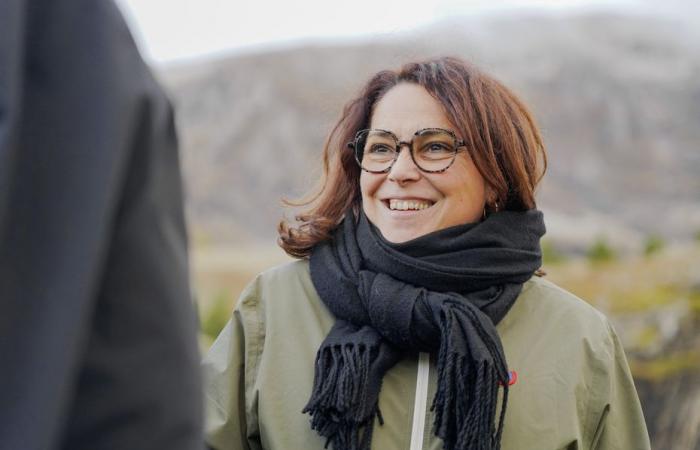A few days before the start of the winter season, the Minister of Tourism Marina Ferrari spoke, in the program “Dimanche en politique”, on the future of ski resorts faced with the consequences of global warming.
The essentials of the day: our exclusive selection
Every day, our editorial team reserves the best regional news for you. A selection just for you, to stay in touch with your regions.
France Télévisions uses your email address to send you the newsletter “The essentials of the day: our exclusive selection”. You can unsubscribe at any time via the link at the bottom of this newsletter. Our privacy policy
Home straight for the ski resorts which are preparing, in a few days, to welcome thousands of tourists for the winter. But for several seasons, the areas have had to reconcile tourist activity with the effects of global warming.
As part of an interview carried out for the show Sunday in politicsbroadcast this Sunday, November 17, the Minister of Tourism, Marina Ferrari, spoke about the future of ski resorts and the need, for some of them, to imagine new models.
France 3 Alpes: Several ski resorts in the Northern Alps have closed down in recent years. Is alpine skiing ultimately doomed?
Marina Ferrari : Skiing is not condemned. Some low and medium altitude resorts are facing the full force of the effects of global warming and the lack of snow. They are rapidly changing their model with difficult choices to make.
Should we still invest in these resorts, raise their snow front, change the ski lifts or will the scarcity of snow, whatever happens, condemn these resorts?
We must reinvest where it is still possible. The resorts are very involved in observing the snow cover. There is a ClimSnow study which is very important and which gives them snow forecasts for 40 or 50 years. We know that certain areas are not threatened. But for all that, they should not wait too long to think about their economic model in 40 or 50 years.
Low and medium altitude stations have already been hit hard. We have to help them. But I am hopeful, we will continue to ski.
Many citizen movements are forming against hill reservoir projects. Other actions targeted vandalized snow cannons. Doesn’t this show that part of the population rejects the all-ski model?
Generally speaking, there is a problem with the acceptability of tourist activities. We see it in the mountains, but also on the coast with problems of overcrowding. Which means that we see phenomena of rejection of tourism in certain places.
I think we need to be pedagogical: there are a lot of preconceived ideas, a lack of understanding of the issues and the reality of the impact on biodiversity. All the studies carried out by local elected officials make it possible to objectify these situations.
For example, when we talk about artificial snowmaking, it is true that a few years ago, we put additives in the water, cooling products. Now it’s over with much more virtuous current practices.
Very little water resources are withdrawn. For example, in an area like Savoie, less than 1% of all water consumption is used (for artificial snowmaking). Then, this water is returned to the environment, when the snow melts.
However, in the summer of 2023, certain villages were supplied with water by tanker trucks…
These are questions that are beginning to emerge strongly. Precisely, for me, they must question us about hill reservoirs. The reservoirs that we know of were designed solely for snowmaking. From now on, they have other vocations, such as helping pastoralism, populations, agriculture, fire safety, but also energy.
At the Superdévoluy station, a gravitational system of the hill reservoirs allows them to produce energy. I would like our fellow citizens to understand that creating a hill reservoir is not only for snow cover, but it is for maintaining our populations.
It is in this context of questions about the future that the 2030 Winter Olympic Games will be organized in the Alps. You are in favor of it, but shouldn’t we also reinvent the model?
I believe these Games are going to be very different. Firstly because they are carried by two regions. We are pooling the effort and the tests will take place on several sites. In the Northern Alps, our sites already exist with facilities from the 1992 Olympic Games which have been maintained.
Sobriety and inclusion: we want these Games to be the most responsible in history since Calgari, but also the most economical. This is the objective that we set ourselves with a budgetary framework of 2 billion euros.
Watch the full interview on the show Sunday in politicsbroadcast this Sunday, November 17 from 11:10 a.m. on France 3 Alpes.






